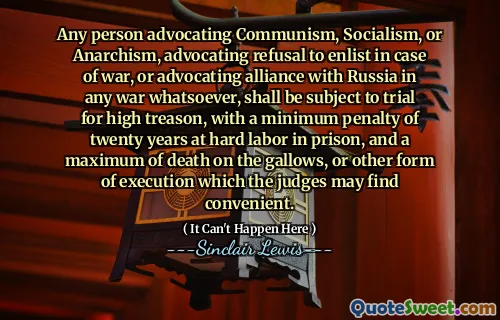But it was indecent, it was sacrilegious to annoy an emperor, and in his irritation he had an ex-Senator and twelve workmen who were in concentration camps taken out and shot on the charge that they had told irreverent stories about him.
In Sinclair Lewis's novel "It Can't Happen Here," the narrative explores the dangerous consequences of irritating those in power, particularly an emperor's wrath. The protagonist highlights the chilling reality where even mere annoyance can lead to severe punishment, revealing the dark aspects of authoritarian regimes.
This particular event reflects the grave injustices prevalent in such a society. The emperor responds to perceived disrespect by ordering the execution of an ex-Senator and several workmen, emphasizing how tyranny suppresses freedom of speech and punishes dissent with brutal force.







